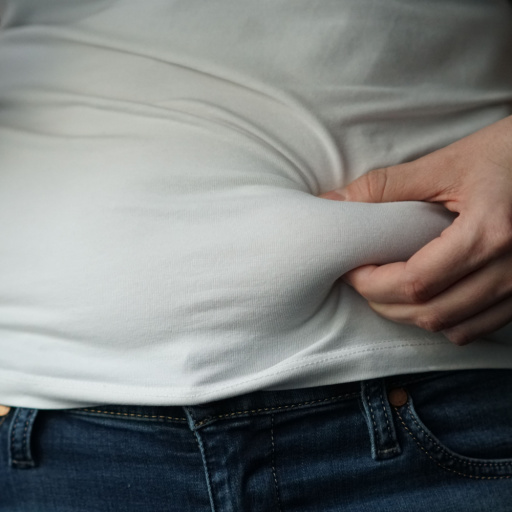Visceral fat, situated deep within your abdominal cavity, surrounds vital organs such as your stomach, liver, and intestines. Don’t confuse it with the subcutaneous fat, which resides just beneath the skin. Visceral fat poses a greater health risk, making diet and exercise the most effective means of avoiding it. So how can you reduce visceral fat? Let’s get started.
What you need to know:
- What is visceral fat?
- What are the causes of excess visceral fat?
- Why is reducing visceral fat important?
- How to reduce visceral fat?
What is visceral fat?

Visceral body fat lies deep within your abdominal walls and is typically present in places surrounding vital organs. While a small amount of visceral fat can protect the organs, too much of it can be dangerous. Visceral fat makes the belly stick out and also produces chemicals and hormones that can be toxic to the body.
It gets stored when you eat too many calories while leading a passive lifestyle. For some people, the excess fat gets stored around their belly rather than hips because of genetic history. Factors such as consuming fatty, oily, or processed food and excess sugar intake can develop visceral fats. Also known as “active fat”, it can later dictate how your body works and moves. Excessive visceral fat increases blood pressure and cholesterol levels and makes you more prone to diabetes, heart diseases and strokes.
What are the causes of excess visceral fat?
Here are some of the main causes that lead to excess visceral fat:
Poor diet
Unhealthy eating habits, characterized by a high intake of processed foods, sugary beverages, and excessive carbs contribute to the buildup of visceral fat.
Sedentary lifestyle
A lack of physical activity and prolonged periods of sitting or inactivity can promote visceral fat storage in the abdominal area.
Genetics
Genetic predisposition can play a role in determining how your body stores fat, potentially leading to an increased accumulation of visceral fat.
Why is reducing visceral fat important?
Excessive visceral fats can indicate serious health conditions like obesity, high blood pressure, cholesterol levels and insulin resistance. These conditions can increase the risk of heart strokes, diseases and type-2 diabetes. Excess visceral fat can also cause:
- Dementia
- Cancer
- Asthma
- Liver disease
- Lower back pain
- Osteoarthritis
How to reduce visceral fat?

Here are some of the ways that you can employ to reduce visceral fat:
Healthy diet
A well-balanced diet contains lean proteins, low-fat dairy products, whole grains as well as a variety of fruits and vegetables. It’s advisable to restrict the consumption of trans fats, refined sugars, sodium, and processed foods. Furthermore, opt for low-carb diets like the ketogenic (keto) diet. It can also aid in reducing visceral fat by utilizing fat for energy instead of carbohydrates.
Regular exercise
Consider engaging in a minimum of 30 minutes of daily exercise, which may involve either cardio or strength training. A popular exercise regimen is high-intensity interval training (HIIT), characterized by alternating periods of high-intensity exercises and brief recovery. HIIT combines both resistance and aerobic training, facilitating a more rapid fat-burning process.
Stress management
Excess stress triggers the release of a hormone known as cortisol. Elevated cortisol levels activate your body’s “fight-or-flight” response, prompting the accumulation of additional visceral fat. To reduce your stress levels, consider incorporating practises such as yoga or meditation into your routine. These activities can help reduce the impact of stress on your visceral fat.
Intermittent fasting
This is a type of weight management strategy that involves going through periods of eating and not eating, resulting in decreased visceral fat content.
Get good sleep
Maintain a healthy sleep cycle. Not getting adequate sleep can increase the risk of accumulating more visceral fats. Get at least 7 hours of sleep every day.
If you want to manage your visceral fats, then it’s vital to check with your doctor regularly. They can track your body fat percentage and provide diet and exercise plans that will help you reduce visceral fats.
Stay tuned to the Activ Living Community. Keep up to date with the latest health tips and trends through expert videos, podcasts, articles, and much more in nutrition, fitness, mindfulness, and lifestyle conditions like Asthma, Blood Pressure, Cholesterol, and Diabetes.
You may also be interested in the following blogs:
- Unlocking The Facts On Healthy Fats: Benefits And Sources
- Living Heart-First: How To Cherish Life Without Straining Your Heart
Popular Searches
How to lower blood pressure | Fruits good for liver | Unhealthy foods | Ragi Benefits | Basal Metabolic Rate | Acupressure points for High Blood Pressure | Ayurvedic medicine for blood pressure | How to control cholesterol at home | Homeopathy for Asthma | Biological Age | Home remedies for TB | Natural beta blockers | Negative effects of internet | Types of walking | Blood pressure calculator | Blood sugar calculator | BMI Calculator





 1800-270-7000
1800-270-7000







